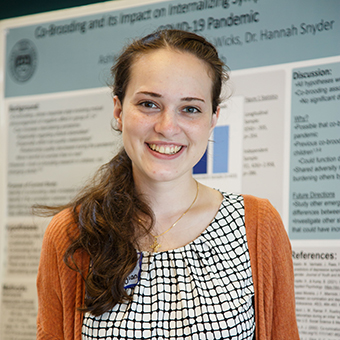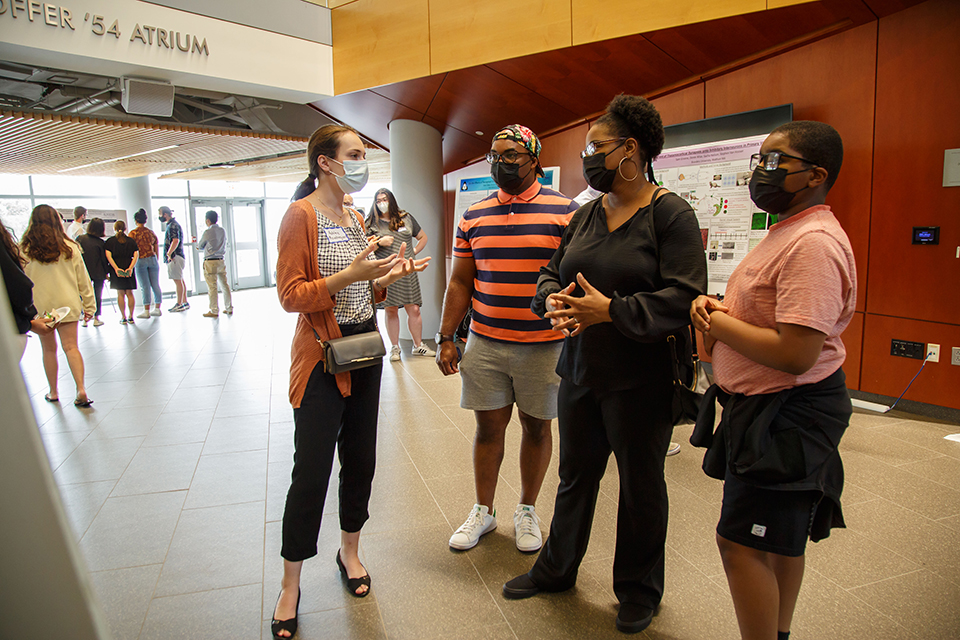Ashley Moushegian
Snyder Lab
Department of Psychology
Brandeis University
Co-Brooding and its Impact on Internalizing Symptoms Before and During the COVID-19 Pandemic
 Internalizing symptoms, such as anxiety and depression, are highly prevalent and debilitating. These symptoms peak in emerging adulthood and have increased further due to the COVID-19 pandemic. Co-brooding, a stress response style involving mutual encouragement of negative affect, could have played a role in this increase in symptoms during the pandemic.
Internalizing symptoms, such as anxiety and depression, are highly prevalent and debilitating. These symptoms peak in emerging adulthood and have increased further due to the COVID-19 pandemic. Co-brooding, a stress response style involving mutual encouragement of negative affect, could have played a role in this increase in symptoms during the pandemic.
We identified two potential mechanisms by which co-brooding may have contributed to this increase during the pandemic: 1) Co-brooding rates may have increased at the onset of the pandemic. 2) The association between co-brooding and internalizing symptoms may have increased at the onset of the pandemic. We also expect the association between co-brooding and internalizing symptoms to be stronger in women than men. These hypotheses were tested in a sample of 433 Brandeis undergraduates, with the following subsamples: 279 participated before the pandemic, 154 participated at its onset, and 57 participants participated at both time points.
Co-brooding rates did not significantly differ between the before the pandemic and at onset subsamples nor did rates significantly change across the longitudinal subsample. Similarly, the association between co-brooding and internalizing symptoms did not significantly change from before the pandemic to at its onset and the association between co-brooding, and internalizing symptoms did not significantly differ between men and women. In short, our data did not support any of our hypotheses. Since previous research on co-brooding was conducted primarily with children, it is possible that the effects of co-brooding differ in emerging adult populations. More research will need to be conducted on emerging adult populations to understand this possible shift in co-brooding outcomes.
Personal Statement
In addition to pursuing my own research this summer, I was able to mentor three new lab members from Hampton University. None of them had worked in a psychology lab before, so it was rewarding to help them gain confidence in their research skills and end the summer with a completed project. The teamwork aspect of research has always been one of my favorite parts of working in a lab. I really enjoy helping others, so it was important to me to spend part of my time this summer helping the newest members of our team. I taught them how to use the Statistical Package for Social Sciences (SPSS), interpret results, and create a research poster. Beyond helping them to succeed in something they previously had no experience with, this mentoring also helped me appreciate how much I have learned over the past few years in my lab from my Principal Investigator and graduate student mentors. The M.R. Bauer Summer Science Research Fellowship allowed me the time to help others alongside Prof. Snyder and her graduate students while also completing my own research project. Through my independent project, I was able to learn a new statistical analysis program, write a manuscript, and explore future directions for research based on my study’s results. Learning from PhD students as well as Prof. Snyder allowed me a glimpse of what life is like for PhD psychological researchers. Expanding the scientific literature surrounding stress response styles was an extremely rewarding experience and one that I will take with me as I continue my career.
Another experience that will stick with me was when all my analyses came out non-significant. Initially, I was extremely disappointed in this outcome. I had been working on this study for over a year and spent a considerable amount of time conducting background research and submitting a preregistration. We also had a considerable sample of 433 participants, so this result was unlikely due to a power issue. What helped me reframe this result was my PI and mentor’s responses. They reminded me that as long as my background research and hypotheses were reasonable, any outcome is useful and valuable in scientific research. My study is on co-brooding in emerging adults, and the vast majority of co-brooding research was previously conducted on children. Taking a step back, I saw that a non-significant result is fascinating. Perhaps the effects of co-brooding shift over the course of the life span. An impactful communication style in children may lose effect in emerging adulthood. I am excited to finish the rest of my manuscript and use the skills I learned this summer to further my research career.
Giving Back Reflection
I loved how the M.R. Bauer Fellowship maintained focus on using what we learned to give back to our community. I used my experiences as a psychology major and researcher this summer to volunteer at Grotonwood Camp, a summer camp dedicated to helping children and adults with a wide range of psychological, learning, and behavioral difficulties. Working with these kids helped me to solidify my motivation to better understand how people live with different psychological and behavioral challenges and how to best support them. I hope that my research in Prof. Snyder’s lab will someday make a practical difference in the lives of children and adults suffering from anxiety and depression.
